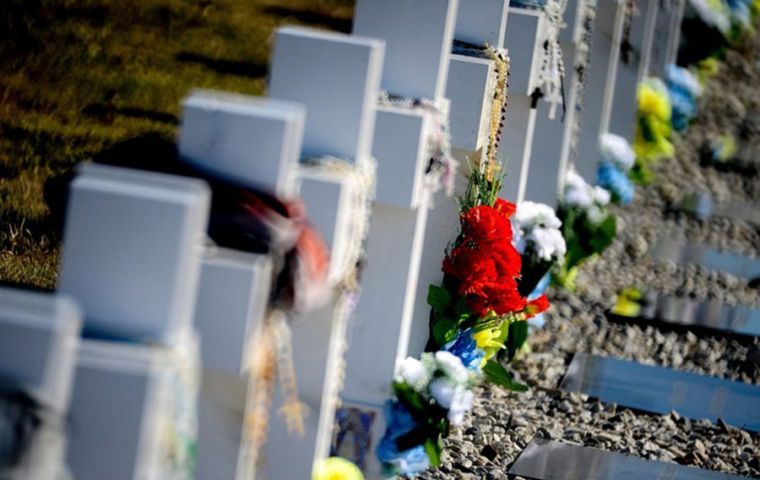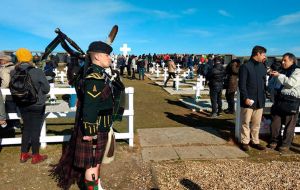MercoPress. South Atlantic News Agency
Falklands: Argentine families visit graves of previously unidentified soldiers
 Families of the 90 Falklands/Malvinas War soldiers recently identified through DNA testing visited the islands,. (Photo via Human Rights Secretariat, Télam)
Families of the 90 Falklands/Malvinas War soldiers recently identified through DNA testing visited the islands,. (Photo via Human Rights Secretariat, Télam)  Argentine families visit on Monday (Pic Telam)
Argentine families visit on Monday (Pic Telam)  Scots Guards members played bagpipes against a backdrop of vast, grassy plains, and some relatives collected stones to bring back to the mainland
Scots Guards members played bagpipes against a backdrop of vast, grassy plains, and some relatives collected stones to bring back to the mainland As readers of Penguin News will be aware, the project leading to the identification of 90 of the 121 previously unidentified soldiers whose graves are found in the Argentine military cemetery at Darwin faced many difficulties.
With many of the families involved coming from the most northerly provinces of Argentina, the logistical challenge of bringing some 241 of them to the Falklands to visit the graves of their loved ones must have appeared almost as great. That it happened and went off successfully last Monday has to be a source of pride for all the many individuals and organisations involved, both in Argentina and the Falkland Islands.
On Sunday, with the meteorological office threatening potentially airport-closing winds on Monday afternoon and heavy weather to follow for the next few days, the whole visit appeared to be in peril. However, a decision taken to bring forward by an hour the already early planned arrival of the three aircraft involved, turned out to be the right one. In the event, the first plane landed just after 6am and the last one to leave took off at around 2.15pm.
By this time the wind, which had been notable by its absence all day, had got up, but was still not threatening aircraft movements.
One consequence of the earlier start was that a long convoy of buses and mini-buses left Stanley for Mount Pleasant at around 5am, rather than six, carrying a team of rather sleepy-eyed people recruited from across government and the private sector. Being in the main Spanish speakers, their function was to act as guides and helpers to the visitors, many of whom were in their eighties. Even earlier, other groups, including police, security staff and a medical team were setting up at Mount Pleasant and at the cemetery, where Nigel Bishop and others had erected tents, installed chemical toilets and were preparing to revive weary visitors and workers alike with hot drinks. If the locals involved were weary, so too were the visitors.
With their flights leaving Ezeiza Airport in Buenos Aires at around 3am and the excitement and emotion of the voyage to come, no doubt very few had managed any
sleep at all.
Despite all of this and with even the fickle climate of the Falklands playing its part to lay on a still and sunny morning, it became evident that the purpose of the occasion, which was to bring some form of peace and closure to the family members, had been achieved.
In the beginning some were clearly overwhelmed with grief, but as the hours wore on to the culmination of the day with a religious ceremony and the participation of a piper and an honour guard from the 4 Scots Regiment, the overriding mood seemed to have changed to one of calm comfort.
Newspapers and web sites around the world this week will be full of this event and the personal stories of so many of those who sat or knelt by the graves of their loved ones, but what sticks in the writer’s mind is the comm. sat or knelt by the graves of their loved ones, but what sticks in the writer’s mind is the comment of a member of the Falkland Islands medical team present who said, “If anyone can look around today and not see this as a really good thing, there must be something wrong with them.”
Timeline
Last week, in the second of two articles about the long process leading to the identification of the previously unknown Argentine soldiers, we made a short reference to the part played by the Falkland Islands Government.
To expand on this, Member of the Legislative Assembly, Barry Elsby has kindly supplied Penguin News with this brief time-line In the 2016 Joint Communiqué the Argentine and British governments expressed their full support for a DNA identification process.
A meeting with all parties: The British Government (HMG), the Government of Argentina (GOA), and the Falkland Islands Government (FIG) took place in Geneva on 9 December 2016 at the headquarters of the International Red Cross (IRC) to discuss next steps, with a project plan formally signed by Ministers in London in December 2016.
Over a seven-week period from June 7 to August 20, 2017), an ICRC forensic team exhumed, analysed and documented the remains of each of the unidentified soldiers.
The ICRC handed over 122 individual reports to HMG and GOA, via respective Geneva Missions, on December 1 and met all the families to discuss their findings.
In Late January and early February there were several reports in the Argentine press about a families’ visit in March. At this stage, GOA had not contacted either FCO or FIG.
Discussions were held between FIG and the Argentine Families Commission on February 7 to discuss a possible visit and highlight that no formal request had actually been forthcoming from the GOA. It was agreed that an initial date of March 26 could be investigated as a possible time for the trip. Subsequently GOA sent a response to FIG, confirming their request for the families to visit the Islands on the March 26, 2018.
Discussions over the course of February and March between FCO, Families Commission, GOA and FIG confirmed the date and logistics. March 26. The successful visit to the Argentine Military Cemetery of over 200 relatives, press and officials took place. (Penguin News)




Top Comments
Disclaimer & comment rules-

-

-

Read all commentsBetter late than never I suppose.
Mar 30th, 2018 - 04:32 am +2The war occurred because the islands were allegedly usurped in 1833.
Mar 30th, 2018 - 09:14 am +1, 'on 3 January 1833 a British Royal Navy corvette with the support of another warship in the vicinity, threatened to use greater force and demanded the surrender and handover of the settlement.' And 'The act of force of 1833, carried out in peacetime without prior communication or declaration by a government friendly to the Argentine Republic...'
Falkland Islands – The Usurpation (1 pg): https://www.academia.edu/34838377/Falkland_Islands_The_Usurpation
I hope they found the visit comforting…
Mar 31st, 2018 - 01:32 pm 0Despite the Bagpipes ;-)
Commenting for this story is now closed.
If you have a Facebook account, become a fan and comment on our Facebook Page!